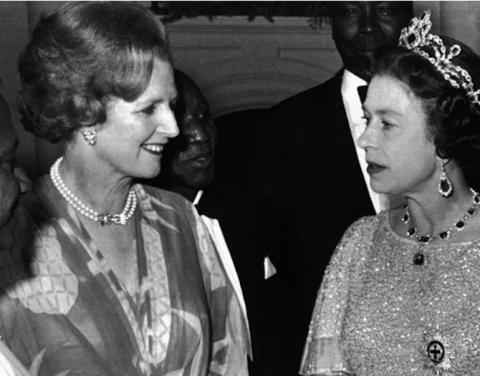How the IRA Nearly Murdered the ‘Iron Lady’ in ‘There Will Be Fire’

There Will Be Fire: Margaret Thatcher, the IRA, and Two Minutes That Changed History
By Rory Carroll
Putnam
416 pages
On October 12, 1984, 100 pounds of gelignite exploded in the Grand Hotel in Brighton, England, where Prime Minister Margaret Thatcher was staying for the annual Conservative Party Conference. The hotel was devastated, five people died, and many more were wounded.
The target of the bombing, known both lovingly and in the most hateful terms as the “Iron Lady,” narrowly escaped assassination.
As Rory Carroll, a journalist for the Guardian and author of There Will Be Fire, notes, the failed assassination attempt took place at the height of The Troubles, “that odd euphemism for sporadic killing” between the Irish Republican Army and British anti-terrorism units. In the 1970s and 1980s, bombs in cars, department stores, and military targets went off with frightening irregularity, fomenting an atmosphere in Ireland and Great Britain of terror, suspicion, and horrific premeditated murder.

No one quite like Margaret Thatcher had ever occupied 10 Downing Street. The Iron Lady’s magnetic personality, coupled with an almost insatiable work ethic, set her apart from more ordinary politicians:
“You felt it as soon as she entered the room. She didn’t walk, she bustled. She didn’t sit so much as coil, poised to spring back up. As she reviewed official documents, her pen tracked the text and swooped on errant phrases and feeble arguments, stabbing the page with underlinings, exclamations, excisions. Running the country didn’t halt her domestic chores, ironed her outfits, and cooked supper. When a visitor spilled coffee on the carpet, she spent twenty minutes scrubbing out the stain. Such things, after all, needed to be done correctly.”
Here was a prime minister dedicated to dismantling much of the state apparatus that had so long been in place in England. She also deeply opposed North Ireland’s efforts to sever all ties with Great Britain. Every bomb attack in London only strengthened her resolve to never cooperate or meet the demands of Sinn Fein, the IRA’s political arm, or the battle-hardened Irish terrorists determined to achieve their goal of independence.

Unfortunately, the series of bombings during that time “exposed a humbling truth about her policy on Northern Ireland,” Carroll writes. “She didn’t have one.”
There Will Be Fire grows out of impressive archival research, as well as more than a hundred interviews with police detective, ex-IRA members, politicians, bomb disposal experts, and many others. In his account of how the plot to assassinate Thatcher unfolded, Carroll offers a measured, even-handed account of The Troubles. This includes years of life-and-death cat-and-mouse games between Scotland Yard’s Anti-Terrorist Branch and the IRA’s so-called “England Department,” the source of planning and implementation of bombings, shootings, and other acts of terror.
When the assassination plan starts to coalesce and IRA operative Patrick Magee conducts a reconnaissance mission at the Grand Hotel, his book achieves “can’t-put-it-down” status. Carroll cleverly structures the story to build to that inexorable moment when a time-delayed explosive device, concealed in a hotel room not far from where Thatcher was staying, finally went off:

“At 02:54:01, the bomb in the bathroom of room 629 detonated. A brilliant, blinding white light pierced the walls and corridors and brick façade … A fireball whooshed through the sixth floor, driven by the exponentially expanding force of the explosive’s compressed power. Blast waves radiated outward through brick and stone, unleashing a roar like thunder.”
Rory Carroll wisely avoids taking sides in the bitter conflict, and his narrative acquires greater credibility as a result. His prose isn’t flashy (nor should it be, given the dire subject matter) but is instead marked by clarity and dispassion. There Will Be Fire is reportage of a high order, of interest to anyone wishing to learn more about The Troubles.
Author Bio:
On the podcast, “Tell Us About Your Book,” Highbrow Magazine’s chief book critic Lee Polevoi discusses his newly published novel, The Confessions of Gabriel Ash.
For Highbrow Magazine
Image Sources:
--Putnam
--Number 10 (Flickr, Creative Commons)
--White House Photo Office (Wikipedia.org, Creative Commons)
--Public Record Office of Northern Ireland (Flickr, Creative Commons)































































































































































































































































































































